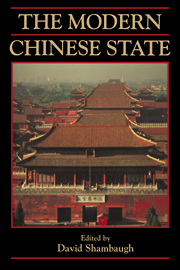Book contents
- Frontmatter
- Contents
- List of Contributors
- List of Illustrations
- List of Abbreviations
- Preface
- Introduction: The Evolving and Eclectic Modern Chinese State
- 1 The Late Imperial Chinese State
- 2 The Chinese State during the Republican Era
- 3 The Evolution of the State in the Republic of China on Taiwan
- 4 The Chinese State during the Maoist Era
- 5 The Chinese State in the Post-Mao Era
- 6 The Chinese Communist Economic State in Comparative Perspective
- 7 The Future of the Chinese State
- Index
Preface
Published online by Cambridge University Press: 15 October 2009
- Frontmatter
- Contents
- List of Contributors
- List of Illustrations
- List of Abbreviations
- Preface
- Introduction: The Evolving and Eclectic Modern Chinese State
- 1 The Late Imperial Chinese State
- 2 The Chinese State during the Republican Era
- 3 The Evolution of the State in the Republic of China on Taiwan
- 4 The Chinese State during the Maoist Era
- 5 The Chinese State in the Post-Mao Era
- 6 The Chinese Communist Economic State in Comparative Perspective
- 7 The Future of the Chinese State
- Index
Summary
This volume owes a debt of gratitude to many. Most of all it owes a special intellectual debt to the memory of Franz Michael (1907–1992), to whom the volume is admiringly dedicated.
Most of the contributors to this volume were either colleagues or students of Professor Michael. Personally, as an undergraduate, he was one of my first teachers of Asian history. He did much to shape my initial understanding of China and Asian civilizations, and he particularly challenged me, as a young liberal, to see how easy it was for unbridled state power to be used in despotic ways. Professor Michael was one of the first Asian scholars to apply the totalitarian paradigm (developed to understand modern fascism and Stalinist communism) to the study of Chinese communism, as he recognized that dictatorships knew no cultural boundaries. This recognition also grew out of his understanding (and debates with Karl Wittfogel) of “Oriental Despotism.” His own European heritage and study of Asia blended intellectually in Professor Michael's critical mind.
Franz Michael's impact on the field of Sinological studies was significant. His influence endures in the number of students that he trained in thirty-five years as a professor of history at the University of Washington, George Washington University, and University of Pittsburgh – many of whom pursued careers as China scholars. He also taught large numbers of students who would enter government service and other pursuits in international affairs. However, through his daunting number of articles and books, Franz's scholarly impact reached beyond those in his classroom. His three-volume The Taiping Rebellion is still considered the classic work on the subject.
- Type
- Chapter
- Information
- The Modern Chinese State , pp. xxi - xxivPublisher: Cambridge University PressPrint publication year: 2000

